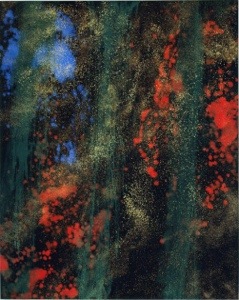Sunday in worship we’ll profess our faith using the historic Apostles’ Creed.
Let me focus your attention on the phrase about the Church.
“Worthy are you to take the scroll and to open its seals, for you were slain, and by your blood you ransomed people for God from every tribe and language and people and nation, and you have made them a kingdom and priests to our God, and they shall reign on the earth.”
Revelation 5:9–10
Although we find ourselves in a world filled with many Christian denominations and individual congregations, we believe in a church that is much bigger than any one of these entities. There is a universal church that is not defined by geographical boundaries, ethnicity, social class, manuals of church order, or any other such factor. Instead, the church universal — the catholic church — includes everyone who trusts in Christ alone for salvation, no matter who they are or where they live. Ultimately, there is but one church, and it includes everyone who is united to Christ Jesus by faith alone. As the Apostle Paul reveals in Ephesians 4:4–6, “There is one body and one Spirit … one Lord, one faith, one baptism, one God and Father of all.”
Revelation 5:9–10 is a key proof text for our belief in the church universal, for it tells us that Jesus Christ, the Lamb of God, has with His blood “ransomed people for God from every tribe and language and people and nation.” God’s kingdom excludes no nationality but welcomes all who repent of their sins and trust in the King of this kingdom. In fact, since today’s passage tells us Christ has already purchased people from every nation and ethnicity, we know that our mission is not complete until the Christian community includes every tribe and tongue in its “membership roster.” The church’s task is to make disciples of all nations (Matt. 28:18–20).
The catholic, or universal, church is the realization of our Lord’s plan for His creation. Through His old covenant prophets, the Holy Spirit foretold a day when the nations would worship the God of Israel (Ps. 22:27; Isa. 19:16–25; Zech. 14:16–19). As the church grows to include all peoples, this prophecy is being fulfilled.
This affirmation is not one of allegiance to the pope or Roman Catholic theology. The term catholic simply means “universal.” –Ligonier Ministries
Reminder: tonight at 6:30 in room 124 at Christ Community will be the first in the Film-Speak movie discussion series sponsored by the Opus Project. Please join us for this remarkable Oscar-winning film.
Film: Life of Pi (2 hours, PG)
Discussion: 30 minutes
Bring your own snacks…and some to share, if you like.
Sunday we’ll begin a series in the gospel of John that will take us through Easter. We’ll be examining (and examined by!) interactions that Jesus had with various folk.
Some religious and others not so much. People in grief and people with doubts. All sorts of people with highly diverse backgrounds and needs.
Jesus changed the life of every person he met in the Gospels, through powerful experiences and words that led them to unexpected and transforming answers to their big questions. These conversations can still address our questions and doubts today. We’ll discover together how people were changed when they met Jesus personally—and how we can be changed today through our own encounter with him.
See you Sunday at 9 or 10:30.
Tim Keller–in the “Reason For God” chapter on God’s judgement–quotes a guy you can hear tonight at UF.
“Many people complain that those who believe in a God of judgment will not approach enemies with a desire to reconcile with them. If you believe in a God who smites evildoers, you may think it perfectly justified to do some of the smiting yourself. Yale theologian Miroslav Volf, a Croatian who has seen the violence in the Balkans, does not see the doctrine of God’s judgment that way. He writes: ‘
If God were not angry at injustice and deception and did not make a final end to violence — that God would not be worthy of worship… The only means of prohibiting all recourse to violence by ourselves is to insist that violence is legitimate only when it comes from God… My thesis that the practice of non-violence requires a belief in divine vengeance will be unpopular with many… in the West. … [But] it takes the quiet of a suburban home for the birth of the thesis that human non-violence [results from the belief in] God’s refusal to judge. In a sun-scorched land, soaked in the blood of the innocent, it will invariably die … [with] other pleasant captivities of the liberal mind
.
Lecture: “Can Religion Help–or only hinder–Global Justice and Peace?”
6:15 p.m., Pugh Center, Room 170
About This Blog
This blog is one of the primary ways that Christ Community's staff can connect and share information. Look for important updates on our community life here each week.
Visit the CCC Website.
View our Church Calendar.
Reminders & Reflections
Blog Archive
- June 2015
- May 2015
- April 2015
- March 2015
- February 2015
- January 2015
- December 2014
- November 2014
- October 2014
- September 2014
- August 2014
- July 2014
- June 2014
- May 2014
- April 2014
- March 2014
- February 2014
- January 2014
- December 2013
- November 2013
- October 2013
- September 2013
- August 2013
- July 2013
- June 2013
- May 2013
- April 2013
- March 2013
- February 2013
- January 2013
- December 2012
- November 2012
- October 2012
- September 2012
- August 2012
- July 2012
- June 2012
- May 2012
- April 2012
- March 2012
- February 2012
- January 2012
- December 2011
- November 2011
- October 2011
- September 2011
- August 2011
- July 2011
- June 2011
- May 2011



